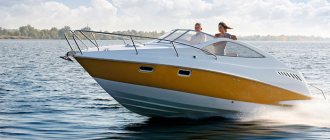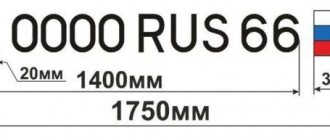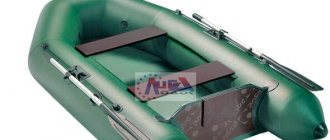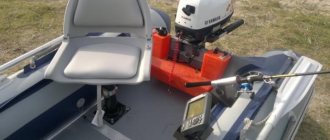The legislative framework
In June 2021, two pieces of legislation were approved regulating the registration of our boats and other watercraft. These are new:
- Rules for state registration of small vessels.
- Administrative regulations of the Ministry of Emergency Situations of the Russian Federation for the provision of public services for state registration of small vessels.
In addition, in October 2021, organizational and methodological guidelines for the application of the new Regulations were issued for GIMS employees. They also contain information useful for skippers.
A number of new registration rules
The new GIMS rules for registering small boats came into force at the beginning of 2021 and have managed to lead to quite serious discussions among the owners of operating small boats.
Prepared acts regarding the registration in the GIMS of various types of modern small vessels:
- “Developed administrative regulations for the structure of the Ministry of Emergency Situations on the provision of services for the registration of various types of small vessels under the supervision of the State Inspectorate of the Inspectorate (Prepared Order No. 339 dated June 24, 2016).
- “Rules for registration of different types of small vessels under the supervision of GIMS (Prepared order No. 340 dated June 24, 2016).
The updated, developed procedure for registering modern small vessels, motor boats and speedboats is significantly different from the procedure developed by Order of the Ministry of Emergency Situations No. 500 of June 29, 2005.
A modern vessel is considered small if its length is up to 20 meters and can accommodate up to 12 passengers. In strict accordance with the previously developed Rules, small types of vessels weighing more than 200 kg, which have an engine with an operating power above 8 kW (9.9 hp), must be registered with the GIMS.
Determination of the mass of a small vessel
In accordance with recommendation letter No. 29/1-3-626 dated March 20, 2019, to determine the exact weight of a small vessel, you can use one of the options:
- The new letter of recommendation contains an instruction to GIMS employees to determine the weight of the boat in accordance with GOST R ISO 8666-2012, that is, taking into account the weight of the motorboat in relation to manufacturers.
For example: a modern boat of the popular Titan 480 model has a curb weight of up to 110 kg. Just a couple of years ago, this boat could be operated with a 9.9 engine, and without undergoing mandatory registration with the GIMS departments, because the total weight of the motorboat in question was not higher than 200 kg. But now you need to take into account the weight of the most powerful outboard engine that can be installed on this boat. Its operating power is 50 hp and its weight exceeds 100 kg. As a result, this kit exceeds the permissible weight of 200 kg, for this reason the boat must be registered.
- For a private owner of a motorboat, the total mass is determined by weighing - the nameplate weight of the boat along with the weight of the actually installed engine, which corresponds to GOST 19356-79.
This is interesting: Recovery train
Changes in registration of small boats in 2021
Let us dwell on the innovations in the registration of boats and boats that directly affect shipowners. I will list the changes and additions in order of their significance for the motorboat driver.
Vessel registration is carried out only at the place of registration of the owner
Previously, there was a choice: it was possible to register a boat either at the place of its permanent location and operation, or at the place of registration of the owner. Now a small vessel is registered only at the place of registration of its owner. Moreover, you can submit documents to any department of the State Inspectorate for Inspectorate of the Ministry of Emergency Situations of the Russian Federation, regardless of where you are registered. An entry in the “Address” line of the Register of Small Boats and a ship ticket will be made at the place of your registration (registration).
Just like with regard to receiving any government service, you can go to any portal of state and municipal services you like or the nearest one and there submit a package of documents for registering a ship, deregistering it, making changes to the ship’s ticket, etc. .
To deregister a vessel, in addition to the owner’s wishes, a legal basis is required
In general, for an ordinary shipowner, accustomed to doing everything according to the rules, this means absolutely nothing. But for magicians who registered their boats just to get license plates (or pass the next technical inspection), and then deregistered the vessel so as not to pay transport tax, this change makes life somewhat more complicated.
Now the owner must justify his desire to exclude the vessel from the Register of Small Boats with a supporting document in hand.
Clause 24 of the new Regulations establishes an exhaustive list of documents , any of which can serve as confirmation of the existence of grounds for deregistering a boat :
- an agreement in relation to a vessel, concluded in accordance with the legislation in force at the location of the vessel at the time of the transaction;
- a judicial act that has entered into legal force;
- decision of a government agency to requisition a vessel;
- certificate of termination of citizenship of the Russian Federation, issued in the name of the owner of the vessel;
- a document confirming the reorganization or liquidation of the legal entity that is the owner of the vessel;
- a document confirming the destruction, structural loss of the vessel, the disappearance of the vessel, as well as the loss of the quality of the vessel as a result of restructuring or any other changes.
If an agreement (purchase, sale, exchange, donation, etc.) is provided as a supporting document, one copy of the agreement remains in GIMS.
Regarding the personal presence of the buyer when deregistering the vessel. Back in 2021 they insisted on this. Now in some departments of GIMS this is not necessary - apparently it is enough to make an entry in the automated information system of the State Inspectorate for Small Vessels of the Ministry of Emergency Situations of Russia.
The identification number of a small vessel has grown significantly
Previously, the tail number had seven characters. Now it consists of 11 characters: two letters, 4 numbers and the designation of a subject of the Russian Federation.
Managing small vessels - are there any changes to the GIMS rules 2021
As noted above, the edition of the GIMS 2021 rules, according to which the state inspection puts forward requirements for small vessels, is still valid for 2021. This also applies to the section on issuing a boatmaster’s license. Once again, let’s go over the main points of obtaining rights to a boat, and note who needs them, how to apply for them and how much it will cost.
Rights to operate small boats
Before we talk about obtaining documents, let us turn once again to the term “small vessels” and the registration procedure.
Thus, a small boat is a vessel whose length should not exceed 20 meters and the total number of people carried on board is no more than 12 people. At the same time, small vessels are subject to mandatory registration with the State Inspectorate for Motor Vehicles if they use engines with a power higher than 10.88 hp. or the mass of the completed vessel exceeds 200 kg.
Those shipowners whose boats and boats do not meet these requirements do not need to contact the state inspectorate. But if the watercraft must be entered into the state register of small vessels, then the navigator must also have official documents confirming the right to operate water transport. Maritime licenses are also issued by GIMS, but to obtain them you need to go through several stages.
Passing exams and procedures for obtaining licenses
All Russian citizens who have reached the age of 18 and are medically fit can obtain the right to operate a small boat. At the same time, before confirming their qualifications as a navigator in the GIMS exam, applicants for obtaining a license must undergo training in a special school.
Training classes for drivers of small boats are conducted by autonomous organizations that have received accreditation and a license for this type of activity. The training format is divided into 2 parts: developing theoretical knowledge and applying it in practice. The entire course lasts approximately 1 month, after which students usually take a final exam and receive an official certificate of completion of the small boat navigator course. The cost of such training depends on the school’s prices, but on average the price varies between 10-20 thousand rubles.
It is worth noting here that theoretically there is a possibility of obtaining rights in GIMS as an external student. To do this, you need to contact the chief inspector of the GIMS department at your place of residence and submit a corresponding application. In this case, the applicant undertakes to independently study the basics of theory and practice, and appear on the appointed day to take the exam to obtain a driving license. However, we note that in practice this decision is almost never used: GIMS does not always agree to such a procedure, and students without the help of the school are rarely able to successfully pass the state exam.
Upon completion of training, graduates of shipping schools are sent to GIMS, where they submit an application for a navigation license. To do this, you must have the following package of documents with you:
- Russian Federation passport;
- Photos 3x4, 2 pcs. (color or b/w);
- A medical certificate confirming admission to operate water transport for health reasons (usually issued during school);
- Certificate of completion of navigation courses.
The inspector registers the application, checks the compliance of documents and sets dates for the theoretical exam and going out on the water to assess practical skills. Subject to successful completion of both parts, the applicant’s documents are sent to the department for issuing state-issued navigation licenses. Students will only have to fulfill the last requirement of GIMS - to pay the state fee for issuing a boatmaster’s certificate. For 2021, its size is 1300 rubles.
You might be interested: Badger boats - model range, characteristics, advantages
The receipt for payment of the fee should be registered with the GIMS inspector, after which all that remains is to wait for the documents to be issued. Typically, the procedure for registration, registration and issuance of a navigation license takes 7-10 days. At the same time, the validity period of boatmaster's licenses issued by the State Inspectorate for Information Systems is calculated for 10 years from the date of issue.
If your shipping license expires in 2021, then you should contact the department of the state inspection of small vessels at your place of residence to reissue the certificate. In this case, you will also need to pay a state fee, but its amount will be only 650 rubles.
You may be interested: Documents for a boat motor
Small vessels and their registration
On May 25, a new federal law No. 36-FZ comes into force and begins to operate, which makes serious changes to the procedure for operating small boats , and clearly defines the criteria by which a boat is classified as such, and which boats no longer require state registration.
a small vessel (the definition of a small vessel is used for the first time in the “new” Russian legislation) is any vessel no more than 20 m long with no more than 12 people on board . In addition, the state duty for registering a small vessel is increased to 1000 rubles, but the fee for conducting a technical inspection will not be charged, since the inspection itself for small vessels is no longer necessary.
Before this, such a concept was only in the order of the Ministry of Transport dated October 14, 2002, but it mentioned separate criteria for types of vessels. For a self-propelled boat - an engine that should have been no more than 75 hp. With. (or any outboard motor). For a rowing vessel, the carrying capacity was considered a sign of small size: for a kayak - at least 150 kg, for a rowing boat - 100 kg, for an inflatable - 225 kg. This definition included many vessels that are widely used by fishermen and tourists, for example, the Svir-K and Ilmen kayaks or the Ufimka-22 rubber boat.
According to the law, small vessels had to be registered with the State Inspectorate for Small Vessels (GIMS), but in reality, vessels with a carrying capacity of 220 kg and with an outboard motor of about 10 liters had to be registered. With. Because of this, conflicts between GIMS and tourists occurred. At the same time, according to the law (Articles 11.8 and 11.9 of the Administrative Code), a small but unpleasant fine is provided for a kayak without side numbers with a carrying capacity of more than 150 kg that has not passed technical inspection - from 500 to 1 thousand rubles.
With the entry into force of the new law, GIMS checks no longer threaten tourists. The new law will take precedence over the 2002 order.
Now, registration of watercraft weighing up to 200 kg and engine power up to 8 kW (10 hp) and sailing ships (yachts) up to 9 m in length without a cabin is . At the same time, the procedure for registering commercial small vessels will take place according to a new procedure, while non-commercial ones will remain under the jurisdiction of the GIMS of the Ministry of Emergency Situations.
The law does not have retroactive effect , and all previously issued documents will be valid until the next re-registration of the vessel.
Questions and answers on small boats and their registration:
Which boats and motors are no longer subject to state registration?
Since the entry into force of Law No. 36-FZ, boats weighing up to 200 kg inclusive and motors with a power up to 8 kW inclusive should not undergo state registration. That is, even such boats as, for example, “Crimea”, “Yuzhanka” or “Ob” are no longer subject to registration.
True, there is one thing: how is the mass of the ship determined? In the explanations to the law V.V. Seryogin said that “the mass of the vessel is determined in accordance with GOST 19356-79 “Recreational rowing and motor vessels. Test methods." Let's see what this same GOST says about this: “The mass of a ship, fully equipped with ship equipment and supplies, should be determined by weighing.” That is, the weight is determined not by the boat’s passport, but by weighing the vessel, and a fully equipped one.
Question: if the boat is equipped with an outboard motor with a power of up to 8 kW and its weight in this configuration exceeds 200 kg, is it subject to registration or not?
All the GIMS specialists to whom we asked this question were unanimous: the weight of the boat is estimated together with the engine. That is, for example, if you are sailing on the Crimea boat, which itself weighs 190 kg, under a 10-horsepower Suzuki weighing 20 kg, then such a craft must be registered.
Is it necessary to undergo technical inspection of watercraft that are not subject to registration?
The GIMS clarification clearly states this: no, it’s not necessary. You just have to keep in mind that if you have a boat weighing less than 200 kg with an engine more powerful than 8 kW, then such a watercraft will have to be registered in the prescribed manner and, accordingly, undergo technical inspection.
In addition, according to the new procedure, one category of registered small vessels is exempt from inspection. These are “rowing vessels owned by individuals and used in inland waters.” In other words, if you have, for example, a wooden rowing boat weighing more than 200 kg, then you will have to register it, but you do not need to take it for an annual inspection.
What should owners of previously registered watercraft do, which, according to the new procedure, do not require registration?
Firstly, such watercraft are not subject to forced deregistration. That is, you can safely use your boat and forget about the need for technical inspection. But at the same time, you shouldn’t forget about two things. The first is transport tax. As long as the boat is listed in the ship's register as a registered watercraft, you will receive notices from the tax office about the need to pay tax. The second thing you should not forget about is the risk of various troubles in the event that your boat is stolen and then some kind of crime is committed with its help. It will take a long time to prove that you have nothing to do with it.
In order to deregister a boat, the owner must submit a corresponding application to the State Inspectorate of the Inspectorate at the place of registration of the craft.
If a watercraft subject to state registration has already been registered, does it need to be re-registered again in accordance with the new law?
No no need. Until May 27, ships were registered in the ship books according to the previous procedure. On May 28, registration of small vessels began in accordance with the new law in the register of small vessels. In this case, the assignment of hull numbers following the last number registered in the ship's book continues in the register. That is, the previous registration is retained, as are the tail numbers.
Is it necessary for a small craft subject to state registration to have a properly registered ship's role?
Indeed, the new law requires that the documents on board a registered small boat include a ship's role. However, in the GIMS explanations there is a special paragraph on this matter: “When carrying out supervisory activities over small vessels, the ship’s role in the composition of ship documents is not required until special instructions.”
Thus, “until further notice” you don’t have to worry about formalizing the ship’s role.
Do I need to be certified to operate a small boat with an engine of less than 10 horsepower?
Before Law No. 36-FZ came into force, it was possible to drive a motor boat without having a driver’s license only if the engine power did not exceed 5 hp. The GIMS clarifications to the new law on this matter say the following:
In accordance with the requirements of the Law, Articles 11.8 and 11.13 of the Code of Administrative Offenses do not apply to ships not subject to state registration until further clarification.
These articles of the Code of Administrative Offenses precisely regulate the availability of a certificate for the right to operate a vessel and sanctions for its absence. That is, if you have a motor with a power of up to 8 kW inclusive and a boat weighing up to 200 kg, then a driver’s license is not required.
N.A., the deputy head of the GIMS Department of the Ministry of Emergency Situations of Russia, answered the question about a driver’s license no less definitely. Kryuchek in his letter dated May 23, 2012: with the entry into force of Federal Law No. 36-FZ, “the grounds for presenting to the owners of small vessels weighing (not carrying capacity) less than 200 kilograms with an installed motor with a power of less than 8 kilowatts are requirements for their registration and availability of a certificate for there will be no right to operate a small vessel.”
How will the state duty for registering a small vessel and for undergoing its technical examination change?
The state fee for registering a small craft will be 1,000 rubles. But as for the technical examination, the explanations of the GIMS say the following: “From the moment the Law comes into force, when carrying out an examination of a small vessel, payment of the state fee for issuing a certificate of seaworthiness of the vessel is not carried out, and the issuance of a technical examination coupon is terminated.”











